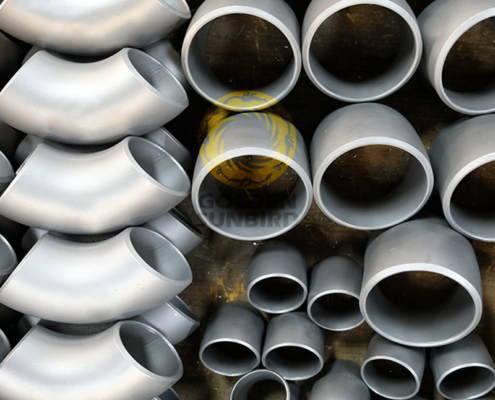Golden Sunbird Metals is a leading Chinese supplier of nickel alloy pipe fittings available in different grades designed to meet the diverse needs of various industries for their corrosion resistance, high-temperature capability, and durability, serving critical roles in chemical processing, oil and gas, power generation, desalination plants, aerospace and defense, pharmaceutical manufacturing, and pulp and paper production. If you want to buy nickel and nickel alloy pipe fittings in bulk or customized nickel alloy pipe fittings, please get in touch with [email protected] for a tailored solution and quote.
FAQs
What types of nickel alloy pipe fittings does Golden Sunbird Metals offer?
Golden Sunbird Metals specializes in producing and exporting various metal products, including nickel alloy pipe fittings. We offer a range of seamless and welded nickel and nickel alloy butt-welding pipe fittings and socket-welding pipe fittings such as 45° and 90° elbows, 180° bends, caps, tees, reducers, lap-joint stub ends, and other types, as covered by ASME B16.9, ASME B16.11, MSS SP-43, MSS SP-95, and MSS SP-97, used in diverse applications such as in chemical, petrochemical, and aerospace industries due to their corrosion resistance high strength.
How can I determine which nickel alloy pipe fittings is right for my project?
Choosing the right nickel alloy pipe fittings for your project involves several considerations. Here are the key factors you should evaluate:
- Corrosion Resistance: Identify the environmental conditions to which the fittings will be exposed.
- Temperature Tolerance: Assess the temperature range that the fittings will encounter.
- Mechanical Properties: Consider the mechanical stress the fittings will undergo.
- Compatibility with Existing Systems: Ensure that the chosen alloy is compatible with other materials in your system to avoid galvanic corrosion or other compatibility issues.
- Regulatory and Standards Compliance: Make sure that the nickel alloy fittings meet the relevant industry standards and regulatory requirements for your project, such as ASTM, ASME, and others.
- Cost Considerations: Nickel alloys can vary significantly in price.
Can Golden Sunbird Metals provide custom sizes for nickel alloy pipe fittings?
Yes! Golden Sunbird Metals can provide custom sizes for nickel alloy pipe fittings. We specialize in producing and exporting various metal products, including nickel alloy pipe fittings, and offer customization options to meet specific project needs. We can supply these products in different grades, sizes, and specifications, catering to various industries, including chemical, food and beverage, aerospace, and more. If you need custom-sized nickel alloy pipe fittings, Golden Sunbird Metals would be a suitable supplier to consider.
What industries commonly use nickel alloy pipe fittings?
Nickel alloy pipe fittings are widely used across various industries for their excellent properties, such as high corrosion resistance, high-temperature performance, and durability. Here are some of the industries that commonly use these fittings:
Chemical Processing: Nickel alloys are resistant to various chemicals and are commonly used in reactors, piping, and pumps in chemical plants.
Oil and Gas: These alloys are used in offshore rigs, sour gas wells, and refineries, particularly in environments where corrosion resistance and high pressure are required.
Power Generation: Power plants use Nickel alloys in superheaters, boilers, and heat exchangers due to their ability to withstand high temperatures and corrosive environments.
Aerospace: Nickel alloys’ high strength and corrosion resistance make them suitable for various aerospace applications, including engines and exhaust systems.
Marine: The marine environment is highly corrosive due to salt water, making nickel alloys preferred for shipbuilding and infrastructure like offshore platforms.
Pharmaceuticals: The hygienic and non-reactive properties of nickel alloys make them suitable for pharmaceutical equipment manufacturing.
Water Treatment: Nickel alloys are used in desalination plants, wastewater treatment facilities, and piping systems due to their corrosion-resistant properties.
Food Processing: Nickel alloys are used in food processing equipment and storage tanks because they do not react with food products and are easy to clean.
Is your nickel alloy pipe fittings environmentally friendly?
Nickel alloy pipe fittings are generally considered environmentally friendly in several ways, mainly due to their durability and corrosion resistance, which lead to a longer lifespan and reduced need for replacements. Here are some key points that highlight their environmental benefits:
Durability: Nickel alloys are highly durable and corrosion-resistant, which means they can last longer than many other materials.
Recyclability: Nickel and its alloys are highly recyclable without loss of quality.
Efficiency: Their resistance to high temperatures and corrosive environments can lead to more efficient chemical processing, refining, and power generation processes.
Safe for Water Systems: Nickel alloys do not leach into drinking water systems, making them safe for use in potable water applications.
Compliance with Regulations: Nickel alloys used in fittings often comply with strict environmental and safety standards.
Can nickel alloy pipe fittings be welded or machined?
Yes, nickel alloy pipe fittings can be welded and machined, though there are specific considerations for each process due to the unique properties of nickel alloys.
Welding Nickel Alloy Pipe Fittings
Nickel alloys can be welded, but it requires specific techniques and precautions to ensure solid and corrosion-resistant welds:
Preparation: The material should be clean and free from contaminants like oil, dirt, or grease. Surface oxides should also be removed before welding.
Welding Process: TIG (Tungsten Inert Gas) welding is commonly used for nickel alloys because it provides high-quality, precise welds. MIG (Metal Inert Gas) welding can also be used.
Welding Environment: Since nickel alloys are sensitive to the absorption of hydrogen, a clean environment and the use of dry, inert shielding gases (like argon) are essential.
Post-Weld Treatment: Depending on the alloy, post-weld heat treatment may be necessary to relieve stresses and restore corrosion resistance.
Machining Nickel Alloy Pipe Fittings
Machining nickel alloys is more challenging than machining standard carbon steel because nickel alloys tend to work harden quickly:
Tooling: High-speed steel or carbide tools are recommended for machining nickel alloys, and tools must be kept sharp.
Cutting Speeds and Feeds: Optimal cutting speeds are generally lower than those for steel. Correct speeds and feeds help avoid work hardening during machining.
Coolants: Coolants are essential for dissipating heat and flushing away chips from the cutting area.



